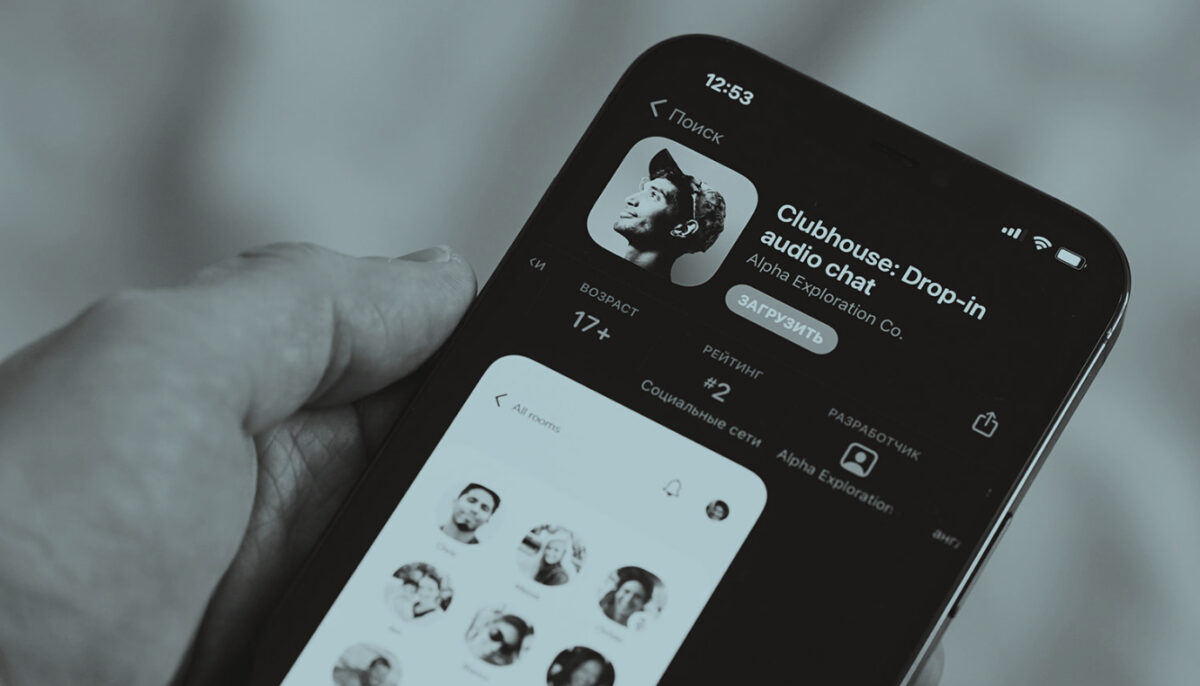Launched around the initial lockdown phase in March 2020, Clubhouse has become a space for virtual audio hang-outs and more serious controversial debates. Participants voiced their opinions about the Gulf’s normalization of Israeli ties, racism, and transgender rights.
This kindling of a sense of connection through the intimacy of voice and improvised conversation unfortunately comes at a price. The app is under scrutiny for privacy breaches, unmoderated offensive and aggressive language, as well as ambiguity regarding data storage.
Authorities in different countries in our region are reportedly blocking or throttling Clubhouse as more people practice free expression on the platform.
Clubhouse, an invitation-only audio-based iPhone app, was launched in April 2020 in San Francisco. Once you get in, you can listen to people’s conversations discussing a wide range of topics, from politics to business and music. Everything takes place live and cannot be recorded—except by the app itself. You can’t share posts, photos, or videos, only people’s voices.
Access to World News and Opinion
The possibility of holding conversations in ephemeral, virtual spaces like Clubhouse has allowed people to work around censorship in countries where freedom of expression is non-existent. In less than a year since its launch, the app exploded in popularity among the tastemakers of tech and popular culture—quickly becoming a virtual town square for debates over free speech and politics. It reached a valuation of $1 billion in the round announced January 24. Clubhouse is currently the number one most-downloaded app in Germany, Japan, Slovakia, and Turkey.
Although the application has suddenly offered a platform for many people to communicate honestly and reckon with their government’s human-rights abuses, recent security concerns about Clubhouse range from technical vulnerabilities to questions about the app’s underlying infrastructure.
Ironically, Clubhouse has faced harsh criticism over misogynistic behavior in chats, reports of racism, and the spread of false information regarding COVID-19 on the platform despite its rules against racism, hate speech, abuse, and false information. Quora moderator Tatiana Estévez outlined some of Clubhouse’s unsettling aspects in thisTwitter thread.
Is Clubhouse Secure?
Clubhouse’s Privacy Policy states that user audio will be “temporarily” recorded, explaining the reasons in its community guidelines. “Solely to support incident investigations, we temporarily record the audio in a room while the room is live,” it explains.
If no trust and safety report is filed, Clubhouse claims that the stored audio is deleted. The policy does not specify the duration of “temporary” storage, keeping the term vague. Are we talking a few days, a few months or a number of years?
Bloomberg also confirmed that a third-party website was scraping and compiling audio from Clubhouse discussions. On February 22, 2021, further revelations followed that Clubhouse discussions were being scratched for an unaffiliated Android app, allowing users on that operating system to listen along in real-time.
Ali Sibai, Digital Security Consultant and Internet Freedom Researcher at SMEX pointed out that Clubhouse’s privacy policy indicates that the social media app can share user data with third parties without notifying the user. Still, it does not specify what kind of information will be shared and the third party.
Clubhouse has also come under fire for aggressively collecting users’ contact information as it asks users to share their address book to add people they already know. It also requires them to invite other people to the forum since the app is still invite-only, contributing to a sense of exclusivity and privacy.
Many users have pointed out that when you invite others, the app also makes suggestions based on which phone numbers in your contacts are also in the interactions of the vast majority of Clubhouse users.
Sibai suggested that users should also be careful about what they discuss in online chatrooms and strongly urges them to refrain from sharing any confidential or personal information. Sibai also warns of possible online scams or inappropriate targeted marketing. At the same time, he shared tips for those considering joining the app,” explaining that, “At the time of posting Clubhouse was unavailable on Android, so beware fake Clubhouse imitations in Google Play.”
Sibai advised users that they shouldn’t trust the application to keep their conversations and actions private. “Share only information you would post in the public domain,” he highlighted.
Clubhouse Unwelcome in Oman, UAE and Jordan
Since early March, users in the United Arab Emirates have complained of “internet throttling,” with full access to the app denied, potentially signaling the start of a crackdown on the up-and-coming social platform.
Throttling, which occurs when service providers slow down internet speed to reduce bandwidth congestion, has been used in some cases by states seeking to “prevent the spread of harmful information”, according to the Network Readiness Index (NRI).
The outage went largely unnoticed as most users access the app through a virtual private network (VPN). A source told The Middle East Eye that the audio was unclear for many users last week, confirming the blackout.
In Oman, the government blocked Clubhouse back in March 15, under claims that “it did not have the right permit.” Nevertheless, activists saw this move as a further violation to their right to freedom of expression. #Oman_blocks_Clubhouse was trending on social media on the same day. Many Omanis shared screenshots of the app displaying an “error message.”
The Omani Association for Human Rights also issued this dispirited statement: “The government of Oman takes the authoritarian government of China as a role model and bans Clubhouse which Omanis have used as a space to express their opinions freely without government censorship.”
According to Arab News, the audio app Clubhouse has opened up unbridled debates on subjects considered sensitive in Saudi Arabia, but surveillance fears have spoken to users in the authoritarian state. “Clubhouse is thriving because there is a plethora of Saudi intellectuals who are interested in debating multiple topics that could be considered taboo or censored in the public realm,” Amani al-Ahmadi, a US-based Saudi-American activist, told AFP.
Jordan was the most recent country to ban Clubhouse, as local users took to social media on March 25, to express their frustration following the application’s ban.
Jordanian journalist Basil Alrafaih wrote on Facebook, “An authority that is afraid to speak, and oppresses its people on the ground and in [online] spaces, cannot confront a pandemic.”
Facebook users explained how it feels unfair that they are silenced while decision-makers continue to speak their minds, and many said that they would download a VPN to use the application.
Audio As the Next Wave of Social Media
The rise of Clubhouse, particularly during the pandemic, reflects a cultural willingness for verbal communication and perhaps a growing comfort with the type of conversation that has become popular on podcasts.
Mahmoud Ghazayel, a journalist who works on fact-checking and tackling misinformation online, discussed with SMEX whether people might use this platform as a window to the news. “As Clubhouse is reaching more users every minute, we as ‘Fact Checkers’ are anticipating seeing false content and more groups created to share it. But we cannot limit its spread without the help of Clubhouse itself, following previous experiences with Youtube/Facebook/Twitter,” Ghazayel told SMEX.
“On a positive note, having an application closed only for voices might be a good thing in killing the share of false links, videos, articles, but might still be effective in talking about wrong information. I guess only time will tell how the application will evolve,” Ghazayel added.
“Initially, the idea behind Clubhouse really excited me, especially since I’m personally interested in audio content. This app proved to be borderless when bringing people together to discuss a wide range of sometimes very important topics,” said Samya Ayish, an avid Clubhouse user and a Google News Initiative Fellow in the Middle East and North Africa, told SMEX.
It’s still up for debate how popular social audio will become. Clubhouse sparks debate about expanding digital connections beyond text, photos, and videos to include traditional voice.
“Many have criticized the app of being over-saturated with blabbers and false experts, but I think listeners have more agency in judging content and filtering it,” Ayish added.
Twitter has already started rolling out Spaces, which replicates the Clubhouse experience. Spotify is also experimenting with live podcasting tools, according to a source that confirmed to The Wall Street Journal.
Nonetheless, we call on Clubhouse and all similar audio platforms to respect users’ privacy and security. We expect and urge these services to handle people’s data with utmost care, responsibility and transparency.
Feature image via Unsplash.



